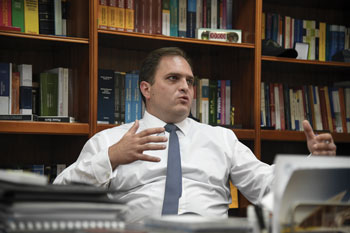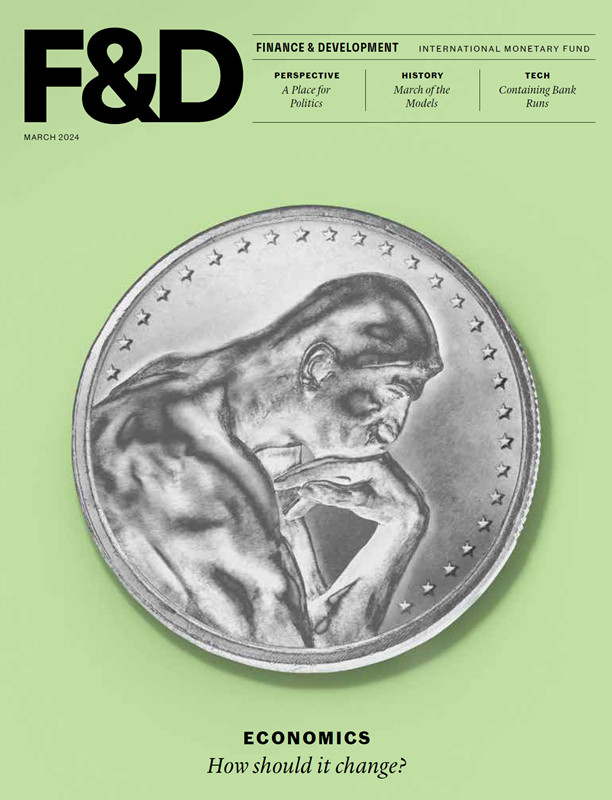The head of Greece’s tax collection agency is on a mission to improve compliance
It is the height of a hot Greek summer, and Athens is mobbed by tourists. Dressed in shorts and sandals, they cram the shops lining the narrow cobblestone alleyways of the historic Plaka district, at the foot of the Acropolis, in search of olives, magnets, T-shirts, and other trinkets. One man haggles with a street vendor over the price of a tote bag. It is the kind of cash transaction that George Pitsilis is trying to stamp out.
If tourist arrivals match last year’s numbers, some 30 million people will visit Greece this year, buying Greek coffees and Greek salads, renting cars and beach umbrellas, and boosting the country’s shrunken economy with €16 billion in spending. Pitsilis, Greece’s chief tax collector, is determined to make sure the value-added tax—a crucial source of revenue for the cash-strapped state—is collected on those transactions.
By law, retailers and other service providers are required to accept credit, debit, and payment cards and issue receipts. But with a 24 percent value-added tax—among the highest in Europe—the temptation to cheat is strong.
So the Greek revenue administration has launched a public relations campaign, dubbed “Apodixi, please,” encouraging tourists to use plastic and ask for a receipt, or apodixi. Pitsilis has also ordered audits and inspections of businesses and has no qualms about shutting down famous restaurants on Mykonos that don’t issue receipts. Publicity is good.
“You increase the awareness, you pass on a message,” Pitsilis says in an interview. Tourists can “do their bit to help the country stand on its own feet.”
Ballooning deficit
Tax evasion is a particular problem for Greece, which significantly lags other EU countries in tax collection efforts. The result is tax rates that are too high and are applied to too few. In 2009, the country saw its budget deficit rocket to more than 15 percent of GDP.
Improving compliance is the key to lowering tax rates and paying for things like better social safety nets and higher public investment. All that would help Greece recover from an eight-year economic crisis that cut its GDP by 25 percent and led to €289 billion in international bailouts.
The problems were myriad at the onset of the crisis. Greece’s shadow, or undeclared, economy was estimated to account for as much as 27 percent of GDP—among the highest percentages in Europe. Some 75 percent of self-employed professionals declared income below the taxable threshold, an IMF study estimated. The tax collection system was antiquated and vulnerable to political interference. Corruption was commonplace. The tax code changed frequently. Disputes got entangled in Greece’s slow-moving court system.
Attempts to doctor the government’s fiscal statistics couldn’t hide the problem. In 2010, Greece promised to slash its bloated budget deficit as part of the emergency assistance package. But the task became harder as the financial crisis deepened. More bailouts followed. In 2015, seeking to prevent a collapse of the banking system, the country imposed capital controls, which included daily limits on how much cash could be withdrawn from automated teller machines.
After efforts to boost collection fell short, the Greek government created the Independent Agency for Public Revenue, aiming to insulate revenue administration from political pressure and free it from some of the complex labor rules that bedevil the Greek bureaucracy. Pitsilis, a 44-year-old lawyer who was born in the United States, raised in Greece, and educated in Greece and France, took charge when the agency opened for business on January 1, 2017.
Pitsilis works in an eighth-floor office in a nondescript Finance Ministry building in downtown Athens. The agency has a separate entrance, a nod to the need to keep it at arm’s length from the political appointees running the ministry. On a recent Friday at 5 p.m., he returns to his office from a meeting, puts on a tie, and gets back to work. His day usually ends at 9:30 p.m.
In May, a day after the government announced that snap parliamentary elections would be held in the summer, Pitsilis convened his staff to deliver a message: for them, it would be business as usual. There would be no relaxation of tax administration, unlike in the past, when tax collectors eased up to help the government curry favor with voters.
Surveillance drones
This summer season, inspectors are fanning out to conduct 50,500 on-the-spot audits and inspections. Surveillance drones hover over Santorini to make sure tour boat operators provide receipts to visitors who come to see the island’s sea-filled volcanic crater. A monthly lottery offers taxpayers rewards of €1,000 for using payment cards in their daily transactions.
Other, more mundane innovations have made a difference. Tax officials have better access to third-party information such as bank accounts, and a dispute resolution system deals with complaints more quickly. The customs unit’s mobile squads, which work on land and sea to conduct random inspections, are being brought under a new central organization; a special unit will focus on investigations in three major sectors: big business, smaller firms and the self-employed, and high-net-worth individuals.
“Tax evasion is not one monolithic thing,” Pitsilis says. “It takes many forms. It’s clear that there is no one-size-fits-all approach.”
Still, it’s clear that the proliferation of point-of-sale terminals, which underpins the new “Apodixi, please” campaign, has been a key to improved tax collection. The number of terminals more than doubled, to some 700,000, in the two years ending in December 2018, according to Cardlink, which runs the country’s largest card acceptance network. The value of transactions jumped to €31.5 billion from €19 billion.
Cash limits
The sudden popularity of plastic coincided with the imposition of capital controls in 2015, when Greeks coped with limits on cash withdrawals by using debit cards to buy gasoline and groceries. The government later moved to require the terminals for a range of professions and businesses.
As the use of point-of-sale terminals soared, so did value-added tax receipts, because payments are collected automatically. Electronic payments contributed at least half of the increase in value-added tax revenue recorded in 2017, according to a study by IOBE, a Greek think tank.
In 2018, those payments jumped by 24 percent to €31 billion, according to a European Commission report, boosting collection of the value-added tax, which accounts for one-third of government revenue. Spending cuts, along with higher revenue, helped generate a budget surplus of 1.1 percent of GDP last year, compared with a deficit of 11.2 percent in 2010.
Electronic payments “have helped because they empower the individual,” Pitsilis says. “It has given individuals the ability to remove themselves from some conversations, to allow them to say, ‘I want to pay by card.’”
Even so, Greece has plenty of room for additional gains; card usage as a percentage of private consumption was 14.8 percentage points below the EU average in 2017, according to IOBE. Annual value-added tax revenues would be 21 percent, or €3.3 billion higher, if Greece were to reach the average EU level, it says.
With the easing of capital controls and limits on cash withdrawals, there’s concern that still-weak tax compliance could suffer. A quarter of the terminals installed in 2017 and 2018 remain inactive, Cardlink representatives told a conference earlier this year.
One reason: unlike their younger, urban counterparts, older Greeks and people living in rural areas still prefer cash. Self-employed professionals routinely offer discounts to customers who pay cash—an agreement that is easier to make in the privacy of the doctor’s office or lawyer’s chambers. That is a serious problem, because the self-employed make up almost 30 percent of the Greek workforce, according to Eurostat—the highest proportion in the European Union and double the EU average.
As a result, the main tax burden was carried by easy-to-tax salaried employees and pensioners, while relatively wealthier self-employed groups evaded the tax net. Promises to ease the tax burden contributed to the election victory in July of Prime Minister Kyriakos Mitsotakis.
“Taxation cannot just be a source of income—it must evolve into a lever of growth,” Mitsotakis said in his first policy speech in Parliament, announcing cuts to property taxes and corporate tax rates. Electronic payments and obligatory electronic invoicing and bookkeeping will broaden the tax base, he said.
Attitude shift

For shopkeepers like Ilias Tsingas who depend on overseas visitors, electronic transactions are a necessity. “Tourists don’t use cash,” he says.
Tsingas, 57, runs a kiosk in central Athens, minutes from Parliament House and on the path of members of the Presidential Guard, who march in their regalia to stand watch outside the Tomb of the Unknown Soldier. His kiosk, which sells everything from facial tissue to plastic soccer balls, is festooned with signs in English proclaiming that he accepts debit and credit cards. Among Greeks, however, only politicians and civil servants are regular users of the terminal because they need to justify expenses, he says.

For Pitsilis, changing that sort of attitude is key to success. It’s time for Greeks to develop a sense of personal responsibility, he says, and avoid the temptation to accept a discount in exchange for a cash payment intended to avoid tax.
“It is incumbent on all of us to understand that such a proposal harms our future, the future of our children, our pensions, and affects whether our child, or our grandchild, finds a job tomorrow,” Pitsilis says. “Because at the end of the day, we all end up paying.”
Opinions expressed in articles and other materials are those of the authors; they do not necessarily reflect IMF policy.










